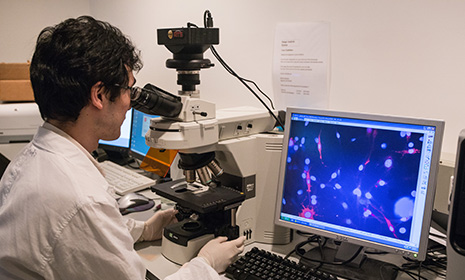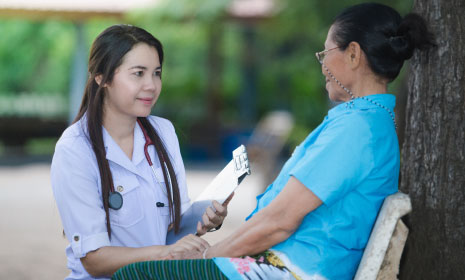Influenza and other infections of public health significance
Researchers
|
Professor Ali, Sheikh Taslim |
Infectious disease epidemiology, transmission dynamics, and outbreak control |
|
|---|---|---|
| Professor Bruzzone, Roberto |
Cell biology of host-pathogen interactions |
|
| Professor Chan, Chi Wai Michael |
Virus-host interaction and pathogenesis |
|
| Professor Cowling, Benjamin John |
Epidemiology and transmission dynamics |
|
| Professor Dhanasekaran, Vijaykrishna | Ecology, evolution, epidemiology and microbial genomics
|
|
| Professor Grépin, Karen (On Leave) | Policy response to control infectious disease outbreaks | |
| Professor Guan, Yi |
Ecology, evolution, transmission and pathogenesis |
|
| Professor Hui, Pui Yan Kenrie |
Risk assessment, pathogenesis and novel therapeutics |
|
| Professor Ip, Kai Ming Dennis |
Epidemiology, surveillance, and control of infectious diseases |
|
| Professor Lam, Tsan Yuk Tommy |
Ecology, evolution, epidemiology and bioinformatics |
|
| Professor Leung, Hiu Lan Nancy |
Epidemiology, respiratory virus transmission and immune responses, community-based longitudinal cohorts and vaccine trials |
|
| Professor Leung, Sze Man Kathy | Infectious disease epidemiology, modeling, and health economics | |
| Professor Peiris, Joseph Sriyal Malik |
Influenza virus, MERS coronavirus, pathogenesis, transmission, ecology sero epidemiology and control |
|
| Professor Poon, Lit Man Leo |
Virology, pathogenesis and diagnostics |
|
|
Professor Quan, Jianchao |
Health policy, economics and health care services |
|
|
Professor Tsang, Kam Lun Tim |
Biostatistics, infectious disease epidemiology and modeling |
|
|
Professor Wong, Sook San |
Population immunity and humoral immunity to respiratory viruses |
|
| Professor Wu, Peng |
Infectious disease epidemiology and AMR |
|
|
Professor Wu, Tsz Kei Joseph |
Epidemiology, modelling and transmission dynamics |
|
| Professor Yen, Hui Ling |
Pathogenesis and transmission |
|
| Professor Zanin, Mark |
Influenza pathogenesis, transmission and novel therapeutics |
|
| Professor Zhu, Huachen Maria |
Ecology, evolution, pathogenesis and transmission |
|
Hong Kong, a densely populated city, is an epicentre for emerging infectious diseases. The city provides an ideal location to study the ecology, transmission and public health interventions of emerging viral pathogens, such as the Middle East respiratory syndrome (MERS) coronavirus, Severe Acute Respiratory Syndrome Coronavirus 2 (SARS-CoV-2) and zoonotic viruses with pandemic potential such as the avian and swine influenza viruses. Our integrated multidisciplinary research programme includes internationally recognised expertise supported by the best laboratory and field resources, in Hong Kong and southern China, with a network of excellent international collaborations. Our research programme has eight foci:
- Ecology, evolution and the origin of pandemic and zoonotic influenza, coronaviruses and other important emerging viruses
- Explore ecological factors favouring interspecies transmission and the drivers of the emergence of pandemic influenza and other viruses
- Conduct animal influenza (e.g. H5N1 and H7N9) and other emerging virus surveillance to understand virus evolution and zoonotic events
- Integrate viral genetic information with viral functionality to identify critical molecular signatures to facilitate identification of field isolates
- Take advantage of the city environment and the encompassing urban and rural landscape of southern China
- Efficient public health interventions for the control of influenza, coronaviruses and other emerging viruses
- Transmission control within communities
- Interventions to control viral disease epidemics
- Epidemiology and control of influenza viruses and coronaviruses
- Novel “universal” vaccine strategies for influenza
- Development and spread of antimicrobial resistance
- Monitor antimicrobial resistance (AMR) bacteria using One Health approach
- Monitor antimicrobial resistance (AMR) bacteria using One Health approach
- Influenza, coronaviruses and other emerging virus pathogenesis
- Viral and host factors related to virus pathogenesis, replication and virus-host interactions
- Viral tropism
- Innate and adaptive host immune responses
- Viral determinants of interspecies transmissions
- Acute lung injury and novel therapeutic options
- Modes of respiratory transmission and transmission dynamics
- Large community-based studies of aerosol transmission
- Experimental transmission using animal models
- Aero-biological studies on airborne particles and virus viability
- Contact tracing within different population subgroups
- Seroepidemiological studies to parameterise mathematical models of virus transmission dynamics
- Infectious disease modelling
- Infectious disease modeling entails developing mathematical models to assimilate various streams of clinical, virologic, demographic, mobility, social and economic data to inform epidemic preparedness, nowcasting, forecasting and response
- Genomic epidemiology and evolution for public health
- Track pathogen transmission over spatial scales, from local outbreaks to global pandemics
- Combine genomic data with individual-level metadata to identify demographic factors driving transmission patterns
- Integrate emerging data sources (such as wastewater surveillance) with population genetics and molecular evolution
- Apply phylodynamics – the combination of epidemiology, evolution, and immunodynamics – to address key questions regarding epidemic preparedness and control
- Changing dynamics of epidemic and endemic viruses under COVID-19 control strategies
- Individual and population immunity
- Community-based longitudinal cohort studies and vaccine trials on influenza and COVID-19 vaccination and infections
- Vaccine reactogenicity and immunogenicity
- Correlates of protection against infection and severe disease
- Individual heterogeneity in immune responses
- Impact of individual and population immunity on herd immunity, transmission dynamics and epidemic size
- Alternative vaccination strategies








.png)
